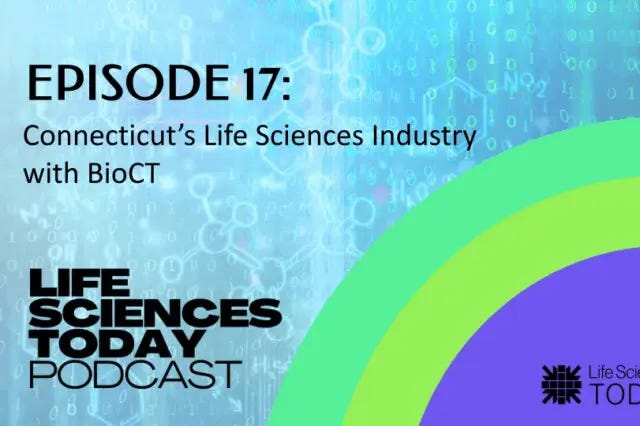Good partner-bad partner
Don’t rely on your gut
Intro
This week’s essay is about choosing good partners in your business.
Founders don’t fail from lack of capital. They fail from choosing the wrong partners/co-founders.
This week in Life Sciences Today podcast
What can three people do that an entire CRO can’t? That’s what I learned from Jodie Gillon, CEO of BioCT (Bio Connecticut).
Jodie Gillon, CEO of BioCT, joined me on the Life Sciences Today podcast. We talked about partnerships.
We discovered several common points (Israel, Connecticut) besides life sciences.
I was fascinated how her small team of 3 full-time employees has developed incredible leverage for hundreds of bio startups in Connecticut coming out of Yale and UConn. With 89% of BioCT members being startups, Jodie has built a statewide network of incubators and a matchmaking engine that connects founders to giants like Pfizer, Medtronic, and Boehringer Ingelheim.
Watch Connecticut’s Life Sciences Industry with BioCT – Life Sciences Today Podcast Episode 17
Jodie’s Background & Journey
Epidemiologist by training, attended Georgetown University
Early career at White House Office of AIDS Policy under Donna Shalala (First Lebanese-American to serve a cabinet position - ran HHS under Clinton)
Made aliyah to Israel and created first HIV advocacy group in Israel after doing national service and a MPH at the Hebrew University,
25+ year industry career including:
Started at Novartis
Transitioned to Pfizer
Led AstraZeneca’s chief medical office
Worked with multiple biotech startups (rare diseases, cell/gene therapy, AI)
Joined BioCT as head 2 years ago
While a native New Yorker, Jodie fell in love with the quiet of New Haven and is proud to call Connecticut her permanent home.
I told Jodie that my grandparents lived in New London.
She said, “Yeah, New London is really quiet”.
I replied, “My uncle was the sheriff of New London in the 60s. He would say that New London is so small, you can’t run in town or you’ll run right out of town”.
Value Creation & Activities
Policy and legislative wins
Recently passed R&D tax credit
Manages AI legislation
Mitigates price controls
Creates public report cards on legislative achievements
Startup support and matchmaking
Connects talent with companies
Links startups with large pharmaceutical companies
Runs programs like Boehringer Ingelheim “office hours”
Recently expanded career portal to include candidates
Manages multiple incubators across state
Partners with university tech transfer offices
Focuses on keeping talent within Connecticut
Good partner-bad partner
Founders don’t fail from lack of capital. They fail from choosing the wrong co-pilot.
Most tech entrepreneurs try to find partners based on their gut feel or personal chemistry.
I personally like the eye test but even with the eye test - you may fail because you pick a partner you like, instead of a partner you need.
After a few failed partnerships of my own, I’ve distilled 4 rules for choosing partners in your business.
Time
You need to find someone who has the hours you don't. If you're working IN the business, find someone who can work ON it.
If you handle engineering, find someone who can run sales.
Expertise
Find a partner who knows what you don't.
If you're great at software development but bad at marketing, find a marketing expert.
If you’re great at business development, but bad at regulatory affairs, find a regulatory affairs expert.
Don't double up on the same skills.
Assets
Look for partners with resources you lack - whether it’s R&D talent, or links into large pharmaceutical companies.
A relative of mine who runs a social initiative non-profit brought in a board member with a massive rolodex of connections and deep pockets.
It was a big win for him.
This brings us to money.
🔒 Want access to founders like Jodie?
Money
If you need capital, find someone who can invest.
But remember - money without the other three is just expensive funding.
The best investment partners also bring time, expertise and assets.
Real Example
In my clinical data startup, I had database and systems integration expertise and a clear picture in my mind of what we wanted to build.
I had been successful in 3 previous startups, and was confident in my business development expertise.
But I lacked connectivity to customers in the clinical trials world.
My first partner was a perfect fit with active relationships with medical device companies. This proved to be key to rapid early-stage growth in the company.
My second partner had expertise and a personal strength in operations. This was key to growth beyond the first 5 customers.
As we grew, we reached a stage where I felt we needed to raise capital. My third partner was supposed to bring capital. I learned the hard way: money without the other three is just expensive funding.
And, we didn’t get the capital either.
Outro
If you’re thinking about a partnership with a person (or another organization) - use these 4 criteria - time, expertise, assets and money to evaluate the partnership.
Don’t rely on your gut. Don’t rely on your eyes.
About Me
I’m a former pharma-tech founder who bootstrapped to exit.
Now I run a private community with 900+ life science leaders helping them maximize their revenue with the right partners.
📈Every Friday: sharp, no-fluff insights on how real techbio companies grow revenue—plus candid interviews with the builders.
Join the private network for techbio entrepreneurs.
About BioCT
BioCT is the life sciences trade organization for Connecticut. It’s part of the national BIO network (46 states have state-level BIO organizations) and the only one that owns and operates its own incubators.
Jodie’s small, high-performance team of three full-time employees delivers incredible leverage through a 20-person board that includes Alexion, Yale, and Jackson Labs.
🔗 Visit BioCT


